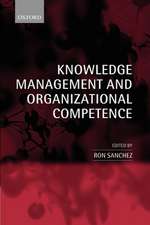Knowledge Management Tools and Techniques
Autor Madanmohan Raoen Limba Engleză Paperback – 23 sep 2004
This practical book focuses on the vast offerings of KM solutions—technology, content, and services. The focus is not on technology details, but on how KM and IT practitioners actually use KM tools and techniques. Over twenty case studies describe the real story of choosing and implementing various KM tools and techniques, and experts analyse the trends in the evolution of these technologies and tools, along with opportunities and challenges facing companies harnessing them. Lessons from successes and failures are drawn, along with roadmaps for companies beginning or expanding their KM practice.
The introductory chapter presents a taxonomy of KM tools, identifies IT implications of KM practices, highlights lessons learned, and provides tips and recommendations for companies using these tools. Relevant literature on KM practices and key findings of market research groups and industry consortia such as IDC, Gartner and APQC, are presented.
The majority of the book is devoted to case studies, featuring clients and vendors along the entire spectrum of solutions: hardware (e.g. handheld/wearable devices), software (e.g. analytics, collaboration, document management) and content (e.g. newsfeeds, market research).
Each chapter is structured along the "8Cs" framework developed by the author: connectivity, content, community, commerce, community, capacity, culture, cooperation and capital. In other words, each chapter addresses how appropriate KM tools and technologies help a company on specific fronts such as fostering adequate employee access to knowledge bodies, user-friendly work-oriented content, communities of practice, a culture of knowledge, learning capacity, a spirit of cooperation, commercial and other incentives, and carefully measured capital investments and returns. Vendor history, product/service offerings, implementation details, client testimonials, ROI reports, and future trends are highlighted.
Experts in the field then provide third-party analysis on trends in KM tools and technique areas, and recommendations for KM practitioners.
| Toate formatele și edițiile | Preț | Express |
|---|---|---|
| Paperback (1) | 683.90 lei 43-57 zile | |
| Taylor & Francis – 23 sep 2004 | 683.90 lei 43-57 zile | |
| Hardback (1) | 1000.27 lei 43-57 zile | |
| Taylor & Francis – 2 noi 2015 | 1000.27 lei 43-57 zile |
Preț: 683.90 lei
Preț vechi: 804.58 lei
-15% Nou
Puncte Express: 1026
Preț estimativ în valută:
130.86€ • 136.100$ • 108.28£
130.86€ • 136.100$ • 108.28£
Carte tipărită la comandă
Livrare economică 07-21 aprilie
Preluare comenzi: 021 569.72.76
Specificații
ISBN-13: 9780750678186
ISBN-10: 0750678186
Pagini: 456
Ilustrații: 1, black & white illustrations
Dimensiuni: 152 x 229 x 25 mm
Greutate: 0.84 kg
Ediția:1
Editura: Taylor & Francis
Colecția Routledge
Locul publicării:Oxford, United Kingdom
ISBN-10: 0750678186
Pagini: 456
Ilustrații: 1, black & white illustrations
Dimensiuni: 152 x 229 x 25 mm
Greutate: 0.84 kg
Ediția:1
Editura: Taylor & Francis
Colecția Routledge
Locul publicării:Oxford, United Kingdom
Public țintă
Professional Practice & DevelopmentCuprins
Table of Contents
Chapter 1: Overview
Case Studies:
Chapter 2: Accenture
Chapter 3: APQC
Chapter 4: Asea Brown Boveri
Chapter 5: Cable&Wireless
Chapter 6: Computer Services Corporation
Chapter 7: Daimler-Chrysler
Chapter 8: easyJet
Chapter 9: Ericsson
Chapter 10: Ernst&Young
Chapter 11: Ford
Chapter 12: Fuji Xerox
Chapter 13: HP
Chapter 14: Innovators Online Network, New Zealand
Chapter 15: Institute for Johns Hopkins Nursing
Chapter 16: KPMG
Chapter 17: National Office of the Information Economy, Australia
Chapter 18: Office of Small Business, Australia
Chapter 19: Rolls-Royce
Chapter 20: Unilever
Chapter 21: World Bank
Consultant/Guru perspectives:
Chapter 22: Ritendra Banerjee (overview)
Chapter 23: Eric Woods (collaboration)
Chapter 24: Arik Johnson (CI, KM and blogging)
Chapter 25: Heidi Collins (knowledge portals)
Chapter 26: Jon Mason (e-learning, KM)
Chapter 27: Patti Anklam, Hutchison Associates (social network analysis)
Chapter 28: Steve Barth (personal KM)
Vendor experiences
Chapter 29: AskMe
Chapter 30: Entopia
Chapter 31: iManage
Chapter 32: Inxight
Chapter 33: ServiceWare
Chapter 34: Author biographies
Chapter 1: Overview
Case Studies:
Chapter 2: Accenture
Chapter 3: APQC
Chapter 4: Asea Brown Boveri
Chapter 5: Cable&Wireless
Chapter 6: Computer Services Corporation
Chapter 7: Daimler-Chrysler
Chapter 8: easyJet
Chapter 9: Ericsson
Chapter 10: Ernst&Young
Chapter 11: Ford
Chapter 12: Fuji Xerox
Chapter 13: HP
Chapter 14: Innovators Online Network, New Zealand
Chapter 15: Institute for Johns Hopkins Nursing
Chapter 16: KPMG
Chapter 17: National Office of the Information Economy, Australia
Chapter 18: Office of Small Business, Australia
Chapter 19: Rolls-Royce
Chapter 20: Unilever
Chapter 21: World Bank
Consultant/Guru perspectives:
Chapter 22: Ritendra Banerjee (overview)
Chapter 23: Eric Woods (collaboration)
Chapter 24: Arik Johnson (CI, KM and blogging)
Chapter 25: Heidi Collins (knowledge portals)
Chapter 26: Jon Mason (e-learning, KM)
Chapter 27: Patti Anklam, Hutchison Associates (social network analysis)
Chapter 28: Steve Barth (personal KM)
Vendor experiences
Chapter 29: AskMe
Chapter 30: Entopia
Chapter 31: iManage
Chapter 32: Inxight
Chapter 33: ServiceWare
Chapter 34: Author biographies
Descriere
Knowledge management (KM) - or the practice of using information and collaboration technologies and processes to capture organizational learning and thereby improve business performance - is becoming one of the key disciplines in management, especially in large companies. Many books, magazines, conferences, vendors, consultancies, Web sites, online communities and email lists have been formed around this concept.
This practical book focuses on the vast offerings of KM solutions—technology, content, and services. The focus is not on technology details, but on how KM and IT practitioners actually use KM tools and techniques. Over twenty case studies describe the real story of choosing and implementing various KM tools and techniques, and experts analyse the trends in the evolution of these technologies and tools, along with opportunities and challenges facing companies harnessing them. Lessons from successes and failures are drawn, along with roadmaps for companies beginning or expanding their KM practice.
The introductory chapter presents a taxonomy of KM tools, identifies IT implications of KM practices, highlights lessons learned, and provides tips and recommendations for companies using these tools. Relevant literature on KM practices and key findings of market research groups and industry consortia such as IDC, Gartner and APQC, are presented.
The majority of the book is devoted to case studies, featuring clients and vendors along the entire spectrum of solutions: hardware (e.g. handheld/wearable devices), software (e.g. analytics, collaboration, document management) and content (e.g. newsfeeds, market research).
Each chapter is structured along the "8Cs" framework developed by the author: connectivity, content, community, commerce, community, capacity, culture, cooperation and capital. In other words, each chapter addresses how appropriate KM tools and technologies help a company on specific fronts such as fostering adequate employee access to knowledge bodies, user-friendly work-oriented content, communities of practice, a culture of knowledge, learning capacity, a spirit of cooperation, commercial and other incentives, and carefully measured capital investments and returns. Vendor history, product/service offerings, implementation details, client testimonials, ROI reports, and future trends are highlighted.
Experts in the field then provide third-party analysis on trends in KM tools and technique areas, and recommendations for KM practitioners.
This practical book focuses on the vast offerings of KM solutions—technology, content, and services. The focus is not on technology details, but on how KM and IT practitioners actually use KM tools and techniques. Over twenty case studies describe the real story of choosing and implementing various KM tools and techniques, and experts analyse the trends in the evolution of these technologies and tools, along with opportunities and challenges facing companies harnessing them. Lessons from successes and failures are drawn, along with roadmaps for companies beginning or expanding their KM practice.
The introductory chapter presents a taxonomy of KM tools, identifies IT implications of KM practices, highlights lessons learned, and provides tips and recommendations for companies using these tools. Relevant literature on KM practices and key findings of market research groups and industry consortia such as IDC, Gartner and APQC, are presented.
The majority of the book is devoted to case studies, featuring clients and vendors along the entire spectrum of solutions: hardware (e.g. handheld/wearable devices), software (e.g. analytics, collaboration, document management) and content (e.g. newsfeeds, market research).
Each chapter is structured along the "8Cs" framework developed by the author: connectivity, content, community, commerce, community, capacity, culture, cooperation and capital. In other words, each chapter addresses how appropriate KM tools and technologies help a company on specific fronts such as fostering adequate employee access to knowledge bodies, user-friendly work-oriented content, communities of practice, a culture of knowledge, learning capacity, a spirit of cooperation, commercial and other incentives, and carefully measured capital investments and returns. Vendor history, product/service offerings, implementation details, client testimonials, ROI reports, and future trends are highlighted.
Experts in the field then provide third-party analysis on trends in KM tools and technique areas, and recommendations for KM practitioners.













